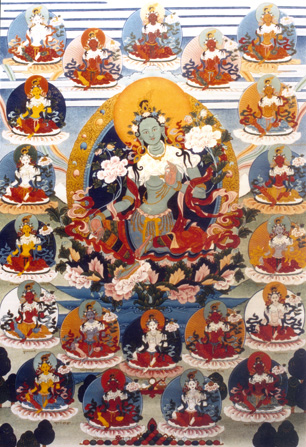Twenty-one Taras: Difference between revisions
Jump to navigation
Jump to search
No edit summary |
Stefan Mang (talk | contribs) No edit summary |
||
| Line 14: | Line 14: | ||
#'''Nor Terma''' (''nor ster ma'') for dispelling poverty and granting good fortune | #'''Nor Terma''' (''nor ster ma'') for dispelling poverty and granting good fortune | ||
#'''Tashi Dönché''' (''bkra shis don byed'') for the auspiciousness of children, fame, rain and so on | #'''Tashi Dönché''' (''bkra shis don byed'') for the auspiciousness of children, fame, rain and so on | ||
#'''Drapung Jomma''' (''dgra | #'''Drapung Jomma''' (''dgra dpung 'joms ma'') for victory in war | ||
#'''Tronyer Chendze''' (''khro gnyer can mdzad''; Skt. ''Bhṛkuṭī'') for protection from spirits | #'''Tronyer Chendze''' (''khro gnyer can mdzad''; Skt. ''Bhṛkuṭī'') for protection from spirits | ||
#'''Rabtu Shyiwa''' (''rab tu zhi ma''; Skt. ''Praśāntī'') for purifying harmful actions | #'''Rabtu Shyiwa''' (''rab tu zhi ma''; Skt. ''Praśāntī'') for purifying harmful actions | ||
Revision as of 19:34, 13 January 2018

Twenty-one Taras (Tib. སྒྲོལ་མ་ཉེར་གཅིག་, drolma nyerchik, Wyl. sgrol ma nyer gcig) — the twenty-one forms of Tara mentioned in the Tara tantra, together with their benefits, according to Rigdzin Jikmé Lingpa:[1]
- Nyurma Pamo (myur ma dpa' mo; Skt. Pravīrā) for development of bodhichitta
- Yangchenma (dbyangs can ma; Skt. Sarasvati) for knowledge and wisdom
- Sonam Chokter (bsod nams mchog gter) for the force of merit
- Tsuktor Namgyal (gtsug gtor rnam rgyal; Skt. Ushnishavijaya) for long life
- Rikchema (rig byed ma; Skt. Kurukulla) for magnetising people and wealth
- Jikché Chenmo ('jigs byed chen mo; Skt. Mahābairavā) for destroying the power of harmful influences
- Shyenkyi Mitupma (gzhan gyis mi thub ma) for protection from hailstorms and lightning
- Shyen Migyalwa (gzhan mi rgyal ba) for repelling blame
- Sengdeng Nakkyi Drolma (seng ldeng nags kyi sgrol ma; Skt. Khadiravaṇī Tārā) for protection from the eight great fears. (She is the main Tara, green in colour)
- Jikten Sumgyal ('jig rten gsum rgyal; Skt. Trailokavijayā) to have power over the world
- Nor Terma (nor ster ma) for dispelling poverty and granting good fortune
- Tashi Dönché (bkra shis don byed) for the auspiciousness of children, fame, rain and so on
- Drapung Jomma (dgra dpung 'joms ma) for victory in war
- Tronyer Chendze (khro gnyer can mdzad; Skt. Bhṛkuṭī) for protection from spirits
- Rabtu Shyiwa (rab tu zhi ma; Skt. Praśāntī) for purifying harmful actions
- Barwé Öchen ('bar ba'i 'od can) for dispelling spells and negative effects
- Pakmé Nönam (dpag med gnon ma) for protection from robbers, thieves, animals and hunters
- Mabja Chenmo (rma bya chen mo; Skt. Mahāmāyūrī) to protect from and neutralize poison
- Mipam Gyalmo (mi pham rgyal mo) for protection from quarrels and bad dreams
- Ritröma (ri khrod ma; Skt. Śabarī) for protection from epidemics
- Özer Chenma ('od zer can ma; Skt. Marichi) for restoring the spirits and energies of sick people
Alternative Lists
There are two alternative lists of the Twenty-one Taras from the Indian tradition: one from Suryagupta and one from Nagarjuna and Atisha, in which the names, form, colour or function of protection vary. In the Tibetan tradition there are also two lists, which derive from termas: one from Jikmé Lingpa and one from Chokgyur Lingpa.
Notes
- ↑ This list is from yum-ka mkha'-'gro'i nang-sgrub bde-chen snying-po'i gter-bum, based on a translation by Tulku Thondup.
Teachings Given to the Rigpa Sangha
- Jetsün Kushok Chimey Luding, Lerab Ling, 15 June 2016
Further Reading
- Khenchen Palden Sherab and Khenpo Tsewang Dongyal, Tara's Enlightened Activity (Ithaca: Snow Lion, 2007)